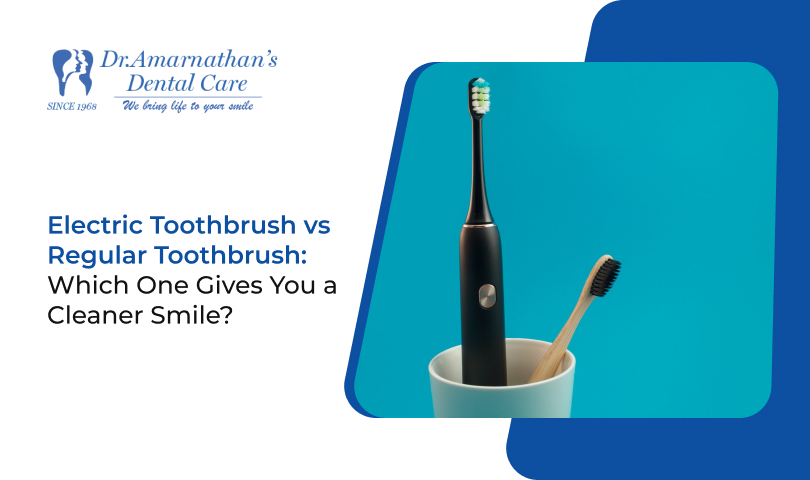
Electric Toothbrush vs Regular Toothbrush: Which One Gives You a Cleaner Smile?
When it comes to achieving a cleaner, healthier smile, the debate between an electric toothbrush vs regular toothbrush is more relevant than ever. Many people are unsure if the added cost and technology of an electric toothbrush actually deliver better results. The problem is that traditional brushing techniques often fall short of removing plaque and preventing gum disease. This blog will agitate that uncertainty by breaking down the key differences and benefits of each option.
Electric Toothbrush vs Regular Toothbrush: What’s the Real Difference?
The primary difference between an electric toothbrush vs regular toothbrush lies in the technology behind each. A regular toothbrush relies solely on manual brushing motions, meaning your brushing technique plays a significant role in its effectiveness. On the other hand, an electric toothbrush uses powered oscillations or vibrations to automatically move the brush head, requiring less effort from the user.
The electric toothbrush’s motorized movement helps dislodge plaque more effectively and can reach areas that might be challenging with manual brushing. This makes the cleaning process more efficient and thorough compared to a regular toothbrush.
How Effective Are Electric Toothbrushes at Removing Plaque?
One of the most common questions about electric toothbrushes is whether they actually perform better at plaque removal compared to regular toothbrushes. Research has demonstrated that electric toothbrushes are more efficient at eliminating plaque. According to research, they can remove up to 21% more plaque and reduce gum inflammation by 11% compared to traditional brushing techniques.
Electric toothbrushes also tend to have timers and pressure sensors that guide users toward brushing for the recommended two minutes and prevent aggressive brushing, which can damage gums and enamel. These features contribute to a more effective cleaning.
Traditional Brushing Techniques: Are They Enough for a Cleaner Smile?
While electric toothbrushes have their advantages, traditional brushing with a regular toothbrush can still lead to a healthy smile if done properly. The effectiveness of a regular toothbrush largely depends on the user’s technique, the duration of brushing, and the pressure applied.
If you consistently brush for two minutes, cover all areas of your mouth, and use the correct technique, a regular toothbrush can be quite effective at removing plaque and preventing cavities. However, maintaining this level of consistency can be difficult for some, and improper technique may not reach all the areas where plaque builds up.
The Technology Behind Electric Toothbrushes: Is It Worth the Investment?
Electric toothbrushes come with a variety of features that enhance the brushing experience. Some models include oscillating brush heads, sonic vibrations, and even UV sanitizing capabilities. These features may seem like luxury additions, but they play a role in improving brushing effectiveness and user experience.
One of the main benefits of the electric toothbrush is its ability to do the work for you. It offers an automated, consistent brushing experience, which is particularly useful for people with limited manual dexterity or those who struggle with brushing for the full recommended time.
Electric Toothbrushes and Gum Health: Do They Really Make a Difference?
Gum health is a critical aspect of overall oral hygiene, and an electric toothbrush may offer advantages over a regular toothbrush in this area. The gentle yet consistent brushing motion of an electric toothbrush can reduce the risk of gum disease, including gingivitis. Regular use can improve gum health by preventing plaque buildup along the gum line, which can lead to inflammation and bleeding.
Moreover, many electric toothbrushes come with built-in pressure sensors, ensuring users don’t brush too hard, which could damage the gums. Over time, electric toothbrushes can help maintain healthier gums and reduce the risk of periodontal issues.
Which Toothbrush Removes More Plaque: Electric or Regular?
When it comes to plaque removal, electric toothbrushes generally have the upper hand. Their automated movement allows for more efficient and consistent plaque removal, especially in hard-to-reach areas. The oscillating or sonic vibrations of an electric toothbrush help break down plaque and food particles more effectively than the back-and-forth motion of a manual brush.
However, if you’re dedicated to using the proper technique with a regular toothbrush—brushing in small, circular motions and ensuring you reach all corners of your mouth—you can still achieve effective plaque removal. The key difference is that electric toothbrushes make it easier to maintain consistent brushing habits, especially for those who struggle with technique.
Cost Comparison: Is the Electric Toothbrush Worth the Extra Expense?
A significant factor to consider when choosing between an electric toothbrush and a regular toothbrush is the price. Electric toothbrushes can range from affordable to high-end models with advanced features. While the upfront cost of an electric toothbrush is higher, many users find that the added expense is worth the improved effectiveness and ease of use.
Additionally, electric toothbrushes often come with replaceable brush heads, which need to be changed every few months. This adds to the long-term cost. Regular toothbrushes, on the other hand, are inexpensive and only need replacing every few months. The final choice depends on your individual preferences and financial considerations.
Ease of Use: Which Toothbrush Is Better for Daily Brushing?
For some, ease of use is the deciding factor when choosing between an electric toothbrush and a regular toothbrush. An electric toothbrush does the hard work for you, requiring less effort to achieve a thorough cleaning. With features like built-in timers and pressure sensors, it’s easy to ensure you’re brushing for the right amount of time with the correct pressure.
On the other hand, regular toothbrushes are lightweight, portable, and don’t require charging or batteries. They’re a great option for people who prefer simplicity and those on a budget.
Long-Term Benefits: Electric Toothbrushes vs Regular Toothbrushes for Oral Health
When considering long-term benefits, the electric toothbrush may offer superior advantages, particularly for those with special oral health needs. Electric toothbrushes help maintain consistency, which is crucial for preventing tooth decay, plaque buildup, and gum disease over time. The enhanced plaque removal and gum protection can also lead to fewer visits to the dentist for cleanings or treatments.
Regular toothbrushes, when used correctly, can certainly help maintain good oral health. Still, the lack of advanced features means they may not be as effective in preventing common dental issues in the long term.
Take Away
The key takeaway is that both electric and regular toothbrushes can provide a cleaner smile, but the right choice depends on your individual needs, preferences, and oral health goals. By understanding the electric toothbrush vs regular toothbrush debate, you can make a more informed decision about which tool will help you achieve the brightest, healthiest smile possible. Whether you opt for the tech-driven electric toothbrush or the simple regular brush, the most important thing is maintaining consistency and good technique in your oral hygiene routine.





It is truly a nice and helpful piece of information. I’m satisfied that you just shared this useful information with us.
Please stay us up to date like this. Thank you for sharing.
Feel free to visit my blog аркада казино зеркало